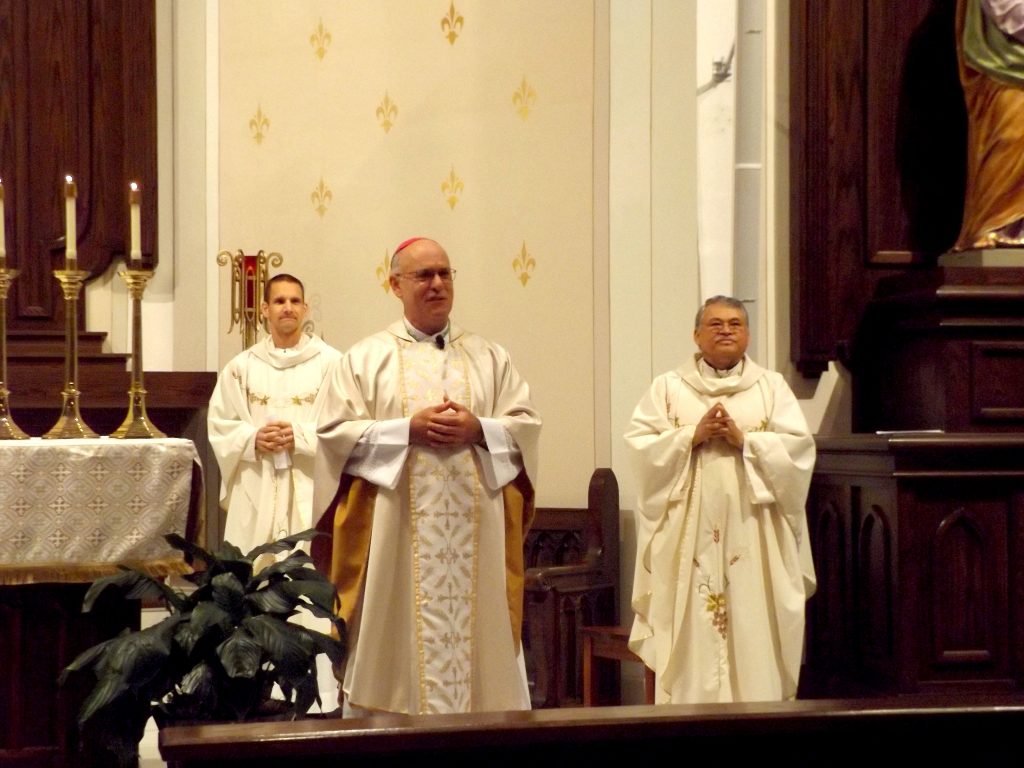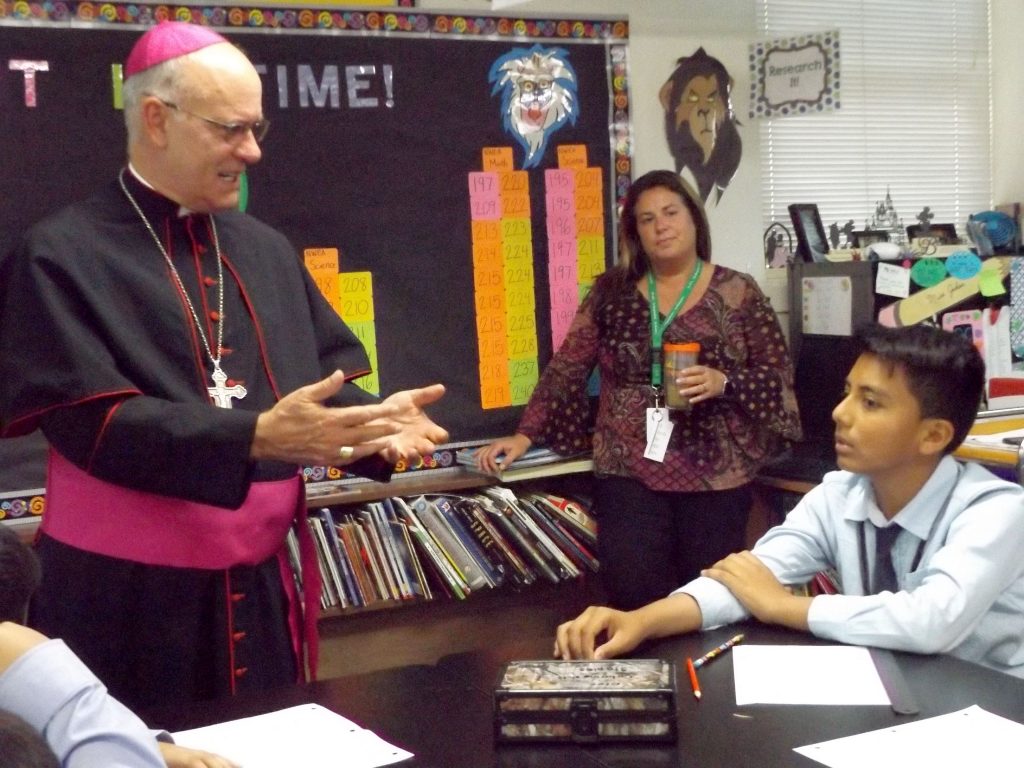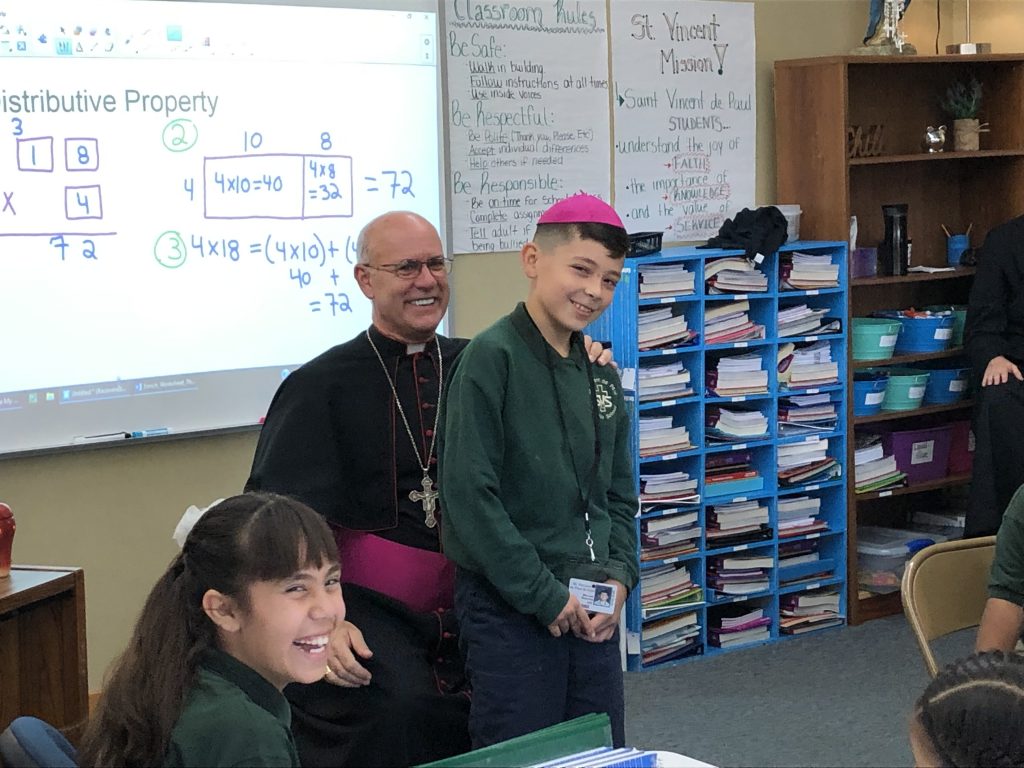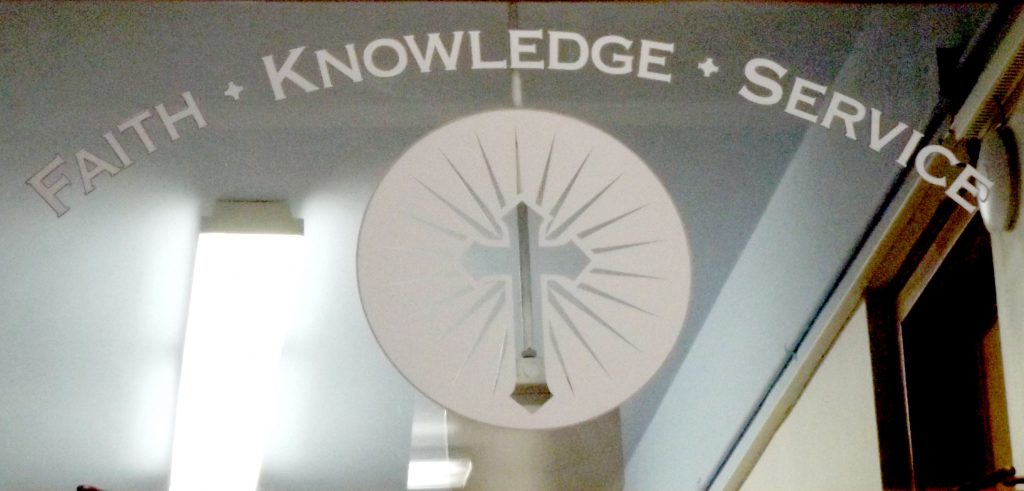October 16, 2019 // Diocese
Success through service encouraged during pastoral visit
ELKHART — On the feast day of its patron, Bishop Kevin C. Rhoades visited St. Vincent de Paul School in downtown Elkhart and encouraged kindergarten through eighth grade students to be like St. Vincent by caring for the poor and sick.
In his opening prayer, the bishop implored: “Like St. Vincent, may we live what he lived and put into practice what he did.”
St. Vincent de Paul School was founded in 1881 by the Sisters of Holy Cross, 13 years after St. Vincent de Paul Church became the first Catholic church in Elkhart. The population of the parish and school at that time was German and Irish; around the year 1900 large numbers of Italian families moved into the area, and soon the language was heard around the church and school.

The bishop greets the students and adults attending Mass at St. Vincent de Paul Parish in Elkhart on the feast day of its patron, Sept. 27. From left are pastor Father Matthew Coonan, Bishop Rhoades and parochial vicar Father Eloy Jimenez. — Photos by Denise Fedorow
Today the Hispanic community has infused the school with a new language and culture.
Enrollment was at its peak in 1959, with a total of 526 students. In 1971 the Sisters of Holy Cross left St. Vincent de Paul School. Amid the financial difficulty of hiring lay replacements the parish chose to keep the school open, but discontinued grades seven and eight. Persevering, the school was able to add a kindergarten class in 1977, preschool in 1993, build a gym and parish center in 1996 and, finally, reinstate grades seven and eight in 2016. Currently, several classrooms are at maximum capacity of 24 students.
An environment that’s ‘positive and relational’
“Thriving” is the word principal Tara Lundy uses today to describe not only the school in general, but its mostly Hispanic student body. Pastor Father Matthew Coonan attributes that success — evidenced in part by a high retention rate — to the “positive and relational feel” across the parish.

Bishop Kevin C. Rhoades answers a question asked by a St. Vincent de Paul School sixth grade student during a pastoral visit to the Elkhart school Sept. 27. The student asked about the steps toward becoming a priest and bishop. Principal Tara Lundy looks on.
St. Vincent students feel particularly connected to their teachers, Lundy said, something that’s encouraged by weekly classroom meetings. For those meetings, students are organized into cross-grade family groups that are led spiritually by a patron saint. Having just one section per grade allows the students in the family groups to become very involved with each other across grade levels, Father Coonan believes, and develops mentorship among the older students while at the same time helping younger students to feel safe and loved.
The staff of St. Vincent de Paul School recognize their mission as sharing the Catholic faith and imparting academic wisdom, but also encompassing foundational needs of the student body.
Once a quarter, parents are invited to the school for engaging back-and-forth discussions on parenting and supporting their child’s education, and on a monthly basis, the entire family is invited to spend an evening at the school family nights. The purpose of parent discussions and family night, Lundy said, is to infuse into the inner-city environment the message that success is possible: success as a parent, success as a student, success as a family and success as a community.
For family night, the staff plans a range of activities around a school subject such as reading, math, religion or wellness. On a family night dedicated to math, number games geared for different ages were played and more were prepared to be taken home and enjoyed. On a past religion-themed family night, participants made sugar skulls and papel picado in observance of Mexican All Souls Day traditions.

A fifth grader smiles after Bishop Rhoades placed his zuchetto on his head for being the student who answered correctly when asked the name of the sacrament that ordains a priest. The bishop then asked the young man if he thought he might be called to be a priest.
Bringing higher education into focus
Because most of the St. Vincent School students and their families are bilingual, the academic focus of the school is language: specifically, the ability to read, comprehend and compose in English. Parents are encouraged to develop the same skills in Spanish, at home.
“We want to strengthen their confidence academically and have them take ownership of their learning,” said Howe.
College readiness is stressed, with the goal being “no matter what your path is, you can be successful when you leave St. Vincent’s,” added Lundy.
By the time students graduate, 80% to 90% of them have internalized the message, Howe guessed, based on the number who sign up for the 21st Century Scholars college scholarship program for income-eligible students.
Mission of St. Vincent and the Church
During his pastoral visit to the school on Sept. 27, Bishop Rhoades noted that in the Gospel reading for the day, Luke 9:18-22, Jesus went around preaching and saw many people who were poor, sick and suffering.
“He said they were like sheep without a shepherd, and it said His heart was moved to compassion and pity,” said the bishop. “We are the Body of Christ, so our hearts also should be moved to compassion for the poor and suffering.”
The mission of St. Vincent was the same as the mission of the Church, he added — to proclaim the Word of God, to celebrate the sacraments and to love: “to bring Christ’s love to the world.” He noted that the Church has a preferential option for the poor.

A stained-glass window at St. Vincent de Paul School highlights the main points of its mission statement.
Visiting the children’s classrooms, the bishop asked what they were learning about their religion. Together they prayed some of their new prayers, and he encouraged them to ask him questions.
He asked Melissa Roberts’ first grade class how to get to heaven. One child exclaimed, “Be a priest!”
Sheila Iannareli’s second grade class is preparing for their first confession, so asked to pray the Act of Contrition with them. “You know that prayer really well,” Bishop Rhoades told them. Father Coonan explained that all students pray the Act of Contrition at the end of the school day.
Leslee McCaffery-Burghduf’s fifth graders asked questions about being a bishop, like how hard a job it is. Bishop Rhoades responded it was “a big responsibility: We have 81 parishes and 43 schools across 14 counties.”
But he told the students he had helpers in the priests, as well as God’s grace. Fifth grader Manuel Ramirez knew that it was the sacrament of holy orders that priests receive, and Bishop Rhoades asked, “Do you think you’re being called to be a priest? How about a bishop?” He placed his zucchetto on his head.
Natalie Jaska’s sixth grade class also had lots of questions for the bishop. One wondered what classes the bishop had to take to become bishop; he explained that he was appointed by St. Pope John Paul II. Another asked if Halloween was a bad holiday to celebrate: the bishop said no, if it is kept fun and nothing bad is done. One girl asked why girls can’t be priests; the bishop explained that Jesus appointed 12 men as apostles, but women had other important roles in His ministry. He also pointed out that over the years, it was often religious sisters who started schools and hospitals. “We’re all equal in dignity, but we have different roles,” he said.
Denise Fedorow contributed to this story.
The best news. Delivered to your inbox.
Subscribe to our mailing list today.






